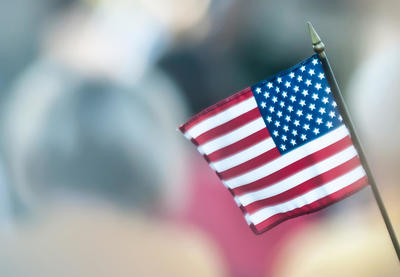My home state, West Virginia, recently observed its first-ever Celebrate Freedom Week. This past year, the state legislature passed a bill requiring all schools to spend the week teaching about the Constitution, Bill of Rights and the Declaration of Independence, the week’s ultimate purpose being to “educate students about the sacrifices made for freedom in the founding of this country.”
I found it the perfect opportunity to teach my students about two landmark Supreme Court cases relevant to both our state’s history and our nation’s history. These cases are all the more relevant today, given the recent controversy surrounding President Trump’s remarks about the NFL and the way many players and others have responded to those remarks.
It was also the perfect opportunity to teach my students about defiance, disobedience and people unafraid to stand up—or sit down—for their rights.
In 1930s Germany, the Nazi government required every citizen to stand and salute the flag. Jehovah’s Witnesses, believing any national flag to be an idol, refused to salute. As a result, 10,000 Jehovah’s Witnesses were arrested and placed in concentration camps.
At the same time in the United States, many school districts required students to salute the American flag during the Pledge of Allegiance. The idea was that such a requirement would foster patriotism in young minds. Two students, Lillian and William Gobitas, refused. These students were expelled from school, which led to the 1940 Supreme Court case Minersville School District v. Gobitis (reflecting a misspelling of the family’s name). In their decision, the Court sided with the school district, which then resulted in an uptick of harassment and bullying of Jehovah’s Witnesses in the United States. PBS and the Bill of Rights Institute offer useful resources regarding this case.
This wasn’t the end of this controversy, though. A few years later, the issue again reached the Supreme Court, this time with 1943’s West Virginia State Department of Education v. Barnette. This was another case featuring Jehovah’s Witnesses expelled from school, for the same offense as the Gobitas children. But this time, the Court sided with the Jehovah’s Witnesses.
In the majority opinion, Justice Robert H. Jackson* wrote, “Freedom to differ is not limited to things that do not matter much. That would be a mere shadow of freedom.”
“One or two students not standing for the pledge may not be a big deal,” I explained to my students when we read this quote, “but in our country, we have freedom to disagree even when things are a big deal.”
Jackson also wrote, “If there is any fixed star in our constitutional constellation, it is that no official … can prescribe what shall be orthodox in politics, nationalism, religion, or other matters of opinion.” Justices Hugo Black and William O. Douglas, concurring, wrote, “Words uttered under coercion are proof of loyalty to nothing but self-interest. Love of country must spring from willing hearts and free minds, inspired by a fair administration of wise laws.”
During our discussion, I told my students that no one can force them to have a particular opinion and that patriotism can’t be forced either. “The country has to give people a reason to be patriotic,” I said.
As a teacher, I am always learning, and if I learned anything during Celebrate Freedom Week, it is that those who stand up for their freedom are often disparaged or persecuted because of their defiance. Over time, if those people, the defiant ones, are persistent and determined, then they can truly effect change in a society, just as several Jehovah’s Witnesses did in the 1930s and ’40s.
President Trump argues that any player kneeling during the national anthem should be fired. I wonder if those players just might end up becoming topics for a future Celebrate Freedom Week, a shining example of people taking action for their rights, for freedom, for understanding that our country’s freedom is not simply a mere shadow.
Webb is an English and social studies teacher in West Virginia.
*The Robert H. Jackson Center provides very valuable information for anybody interested in learning more about West Virginia State Department of Education v. Barnette, including the full text of the majority opinion. If teaching high school or more advanced learners, it could be useful for students to study the full text, though when I discussed the case with my seventh graders, I highlighted only a few key quotes. The quotes I chose are particularly noteworthy given current events, and reading them in the context of the recent NFL controversy, I hope the quotes would make students more empathetic and understanding of those kneeling during the national anthem.


1 COMMENTS